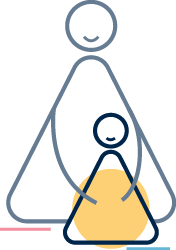The Caribbean Region has high rates of reported violence against children, and physical punishment is often considered an acceptable form of discipline. Estimates of children in the Dominican Republic that are exposed to abuse in the home range from 50-80%. The Dominican Republic, which is the second largest Caribbean nation, is a middle-income country with the largest economy in Central America and the Caribbean. Despite the country’s economic progress, however, problems such as corruption, inequality, and poor access to social services, healthcare and education continue to exacerbate the high rates of violence.
An evaluation of two comprehensive community-based interventions, which provides a variety of services to caregivers and community members, reported several positive outcomes for children and their caregivers:

VIOLENCE AGAINST CHILDREN
Caregivers were less likely to threaten, yell, or use physical punishment to discipline their children. Parents who received the intervention were 2-3 times less likely to respond “yes” to using physical discipline than those who received no intervention.

OVERALL CHILD WELL-BEING
As a result of this intervention, children gained multiple benefits in terms of school readiness and performance, gaining prosocial and behavioral skills, and improving overall well-being.

CAREGIVER MENTAL HEALTH
The intervention was able to reduce levels of stress among caregivers as well as increase nurturing behaviors towards children, which helped develop better child-parent relationships.
Caregivers who reported high stress were more likely to support and use physical punishment to discipline their children.
Community-based interventions should include age-appropriate and child-friendly training curricula that build on positive and culturally relevant child-rearing practices.
Successful strategies for engaging families that were highlighted in this
evaluation included a welcoming and caring environment, accessible and reliable staff, relevant and informative activities, and effective communications.
When conducting an evaluation of this type, it is important to establish a baseline assessment prior to the implementation of the program in order to be able to draw causal inferences from the results.
The two interventions were implemented by the Centers for the Integral Attention of Children (CIANIs) and the Local Community Organizations of Child Protection (LCOCPs). Both organizations are under the auspices of the National Council for the Children’s Protection (CONANI), which develops policies to protect children in the Dominican Republic.
CIANIs provide high quality, comprehensive early childcare and development services to low-income families with children between 45 days and 6 years. The multidisciplinary services, which include educational, health, nutritional, psychological, and social services, are designed to enhance parental capacity, improve parent-child relationships and family functioning, and strengthen community support to families. Although the management and staff of CIANIs were transferred from CONANI to the National Institute for Integral Attention to Early Child Intervention (INAIPI) and the name of the service was changed, the centers continued to provide comprehensive early child care and development services for children aged 45 days old to 5 years.
LCOCPs are local entities responsible for maintaining, enforcing, and ensuring Child Rights. LCOCPs complement and extend CIANIs services: monitoring and reporting, providing peer support and surveillance, and conducting public education and community outreach.
Henry Parada, PhD
School of Social Work, Ryerson University
www.ryerson.ca/socialwork/programs/bsw/
hparada@ryerson.ca
Would you like a concise two-pager on this study? Download the evidence brief!





